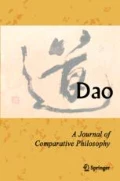Abstract
In contrast to the traditional and ordinary interpretation of Xunzi’s theory of human nature, which considers Xunzi’s theory as claiming that human nature is bad or evil, this article aims at, first, arguing that the interpretation is wrong or at least incomplete and, second, constructing a new interpretation that, according to Xunzi’s text, there are some factors in human nature that are able to promote good behaviors. I shall demonstrate that some major paragraphs in Xunzi’s text were misinterpreted and misarranged, analyze that the word wei (artifice) in the chapter of “Zhengming” has two different but related senses, one of which designates some of the potential capacities of human nature, and argue that the 23 words in the chapter of “Rongru” should not be deleted as redundant, as was done by the two famous philologists in Qing dynasdy, Wang Niansun and Wang Xianqian.
Similar content being viewed by others
References
Chen, Daqi 陳大齊. 1954. Xunzi’s Thought 荀子學說. Taipei: Zhonghua Wenhua Chuban Shiye Weiyuanhui 中華文化出版事業委員會.
Cua, Antonio. 2005. Human Nature, Ritual, and History: Studies in Xunzi and Chinese Philosophy. Washington DC: Catholic University of America Press.
Fu, Sinian 傅斯年. 1940. Critical Examination of the Ancient Teachings on Human Nature and Destiny 性命古訓辨證. Changsha 長沙: Shangwu Yinshuguan 商務印書館.
Fung, Yiu-ming 馮耀明. 1992. Chinese Philosophy in the Ancient Period 中國古代哲學思想 (4 volumes). Hong Kong: The Open University of Hong Kong.
_____. 2005. “A New Interpretation of Xunzi’s Theory of Human Nature: With an Appendix on the Rectification of the Redundancy Problem of 23 Words in the ‘Rong-ru’ Chapter 荀子人性論新詮: 附〈榮辱〉篇23字衍之糾謬.” NCCU Philosophical Journal 14: 169-230.
Fung, Yu-lan. 1948. A Short History of Chinese Philosophy. Edited by Derk Bodde. New York: Macmillan.
_____. 1952. A History of Chinese Philosophy. Translated by Derk Bodde. Princeton: Princeton University Press.
Graham, A. C. 1967. “The Background of the Mencian Theory of Human Nature.” Tsing Hua Journal of Chinese Studies (new series) 6: 215-74.
Hu, Shi 胡適. 1970. An Outline of History of Chinese Philosophy, vol.1 中國哲學史大綱. Taipei: Shangwu Yinshuguan 商務印書館.
Li, Ling 李零. 2002. Reading Notes on the Guodian Bamboo Scripts of Chu 郭店楚簡校讀記. Beijing 北京: Beijing Daxue Chubanshe北京大學出版社.
Nadeau, Randall. 1995. “Xunzi.” In Great Thinkers of the Eastern World. Ed. by Ian McGreal. New York: Harper-Collins.
Pang, Pu 龐樸. 2000. “An Explanation of the Writings of Ying and Yan: A Preliminary Study of the Words with “Xin” (Mind) as Radical in the Three Utensils of Zhong-shan and Guo-dian Chu Bamboo Scripts” 郢燕書說:郭店楚簡中山三器心旁文字試說. In Proceedings of the International Conference on Guodian Chu-jian 郭店楚簡國際學術研討會論文集. Edited by the Institute for Chinese Culture 中國文化研究院, Wuhan University. Wuhan 武漢: Hubei People’s Publisher 湖北人民出版社.
Schwartz, Benjamin. 1985. The World of Thought in Ancient China. Cambridge, Massachusetts, and London: The Belknap Press of Harvard University press.
Shen, Youding 沈有鼎. 1992. Collected Essays of shen Youding 沈有鼎文集. Beijing 北京: Renmin Chubanshe 人民出版社.
Tang, Duanzheng 唐端正. 1977. “The Epistemological Issues in Xunzi’s Concept of Human Goodness as Resulting from Effort 荀子善偽論所展示的知識問題. Zhongguo Xueren 中國學人. 6: 11-24.
Wang, Xianqian 王先謙. 1988. Collected Interpretations of Xunzi 荀子集解. Beijing 北京: Zhonghua Shuju 中華書局.
Xunzi. 1999. In Library of Chinese Classics (Chinese-English). Translated into English by John Knoblock and translated into Modern Chinese by Zhang Hue 張覺. Changsha 長沙: Hu’nan Renmin Chubanshe 湖南人民出版社, and Beijing 北京: Waiwen Chubanshe 外文出版社.
Yao, Xingzhong. 2000. An Introduction to Confucianism. Cambridge: Cambridge University Press.
Author information
Authors and Affiliations
Corresponding author
Rights and permissions
About this article
Cite this article
Fung 馮耀明, Ym. Two Senses of “Wei 偽”: A New Interpretation of Xunzi’s Theory of Human Nature. Dao 11, 187–200 (2012). https://doi.org/10.1007/s11712-012-9268-z
Published:
Issue Date:
DOI: https://doi.org/10.1007/s11712-012-9268-z




